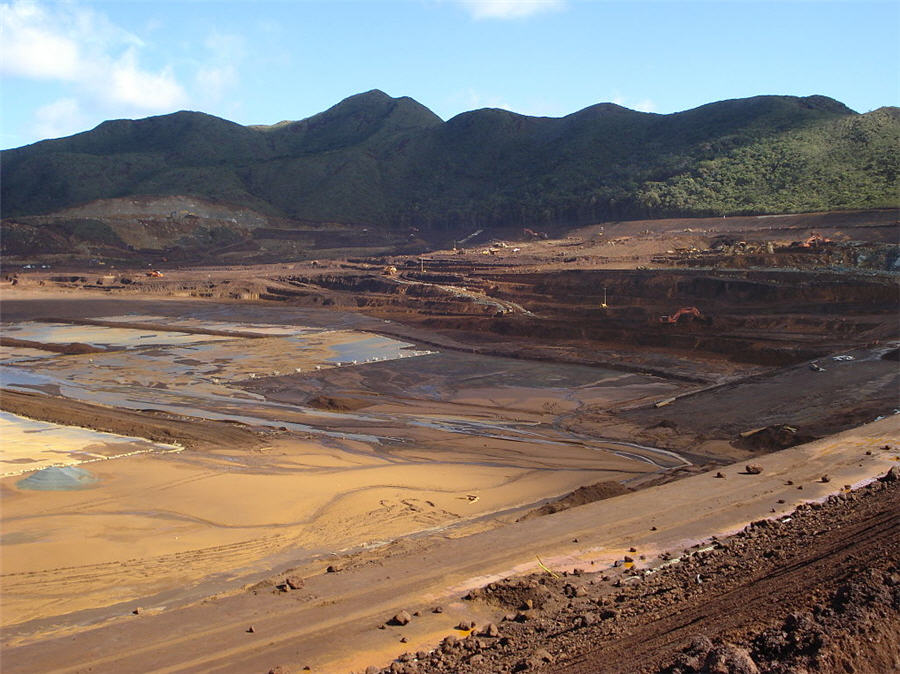Tesla-backed nickel miner cuts output after waste dam leak
Bloomberg News | November 14, 2022

Construction of a tailings storage area Goro Nickel Mine, Kwe West Bassin, New Caledonia – Image courtesy of Wikimedia Commons.
The troubled Goro nickel mine — one of the world’s largest deposits, which is part-owned by Trafigura Group and backed by Tesla Inc. — has been forced to reduce production to address a leak from its tailings dam.

Goro, which is located in the South Pacific territory of New Caledonia, reported a “limited release of salt-laden liquid” after heavy rains in August, a spokesperson for owner Prony Resources said by email. Corrective measures required by local authorities mean that nickel output will be reduced in the fourth quarter, the company said.
The cuts at Goro are the latest example of global nickel mines disappointing at a time when the outlook for demand is soaring for use in electric-vehicle batteries. Production is booming in top supplier Indonesia, but there have been a slew of cuts or misses elsewhere, including by Eramet SA, which recently lowered its annual production target in New Caledonia, while Solway Investment Group shuttered a ferronickel plant in Ukraine due to power outages after Russian air strikes.
“The corrective measures required by the South Province mean that Prony Resources New Caledonia’s nickel production will be reduced in the fourth quarter,” the company said. “The minimum quantities required by our customer contracts will be met and we expect to be at full capacity again shortly.”
It declined to give more details or comment on when production would return to normal.
Goro was previously owned by Brazilian miner Vale SA, which sold the asset last year to Prony — a consortium made up of employees, commodities trader Trafigura, Agio Global, and the New Caledonian government. The group announced an agreement at the time with Tesla to support the operation through a “technical and industrial partnership.”

Construction of a tailings storage area Goro Nickel Mine, Kwe West Bassin, New Caledonia – Image courtesy of Wikimedia Commons.
The troubled Goro nickel mine — one of the world’s largest deposits, which is part-owned by Trafigura Group and backed by Tesla Inc. — has been forced to reduce production to address a leak from its tailings dam.

Goro, which is located in the South Pacific territory of New Caledonia, reported a “limited release of salt-laden liquid” after heavy rains in August, a spokesperson for owner Prony Resources said by email. Corrective measures required by local authorities mean that nickel output will be reduced in the fourth quarter, the company said.
The cuts at Goro are the latest example of global nickel mines disappointing at a time when the outlook for demand is soaring for use in electric-vehicle batteries. Production is booming in top supplier Indonesia, but there have been a slew of cuts or misses elsewhere, including by Eramet SA, which recently lowered its annual production target in New Caledonia, while Solway Investment Group shuttered a ferronickel plant in Ukraine due to power outages after Russian air strikes.
“The corrective measures required by the South Province mean that Prony Resources New Caledonia’s nickel production will be reduced in the fourth quarter,” the company said. “The minimum quantities required by our customer contracts will be met and we expect to be at full capacity again shortly.”
It declined to give more details or comment on when production would return to normal.
Goro was previously owned by Brazilian miner Vale SA, which sold the asset last year to Prony — a consortium made up of employees, commodities trader Trafigura, Agio Global, and the New Caledonian government. The group announced an agreement at the time with Tesla to support the operation through a “technical and industrial partnership.”
Operational woes
Under Vale’s ownership, Goro was beset by operational woes and cost overruns — becoming a byword for the mining industry’s inability to deliver projects on time and on budget — and the deal with Prony only materialized after years of trying to find a buyer.
Mine tailings dams have also drawn increased international scrutiny after a collapse at one of Vale’s iron ore mines at Brumadinho in Brazil in 2019 killed 270 people, in one of the most deadly mining accidents in modern history.
At Goro, Prony said it has increased monitoring of the dam and hasn’t found any significant changes that could affect its stability.
The company was required to lower the water levels in the dam and ordered to take immediate corrective measures because of environmental concerns, the South Province, the local authority, said in an Oct. 14 statement.
The situation is still being analyzed, Mandy Brizard, a spokesperson for the province, said this week.
In its annual report last year, Trafigura said that priorities for the mine in 2022 “include progressing with a tailings drystacking project to reduce tailings storage risk and protect the environment,” which it said would increase production to at least 35,000 tons a year.
New Caledonia’s output of nickel hydroxide cake, or NHC, of which Prony is the key producer, rose 41% in the first nine months of 2022 from the same period a year earlier to 19,662 tons of nickel content, according to a report from the government.
(By Mathieu Dion and Jack Farchy, with assistance from Mark Burton)
No comments:
Post a Comment